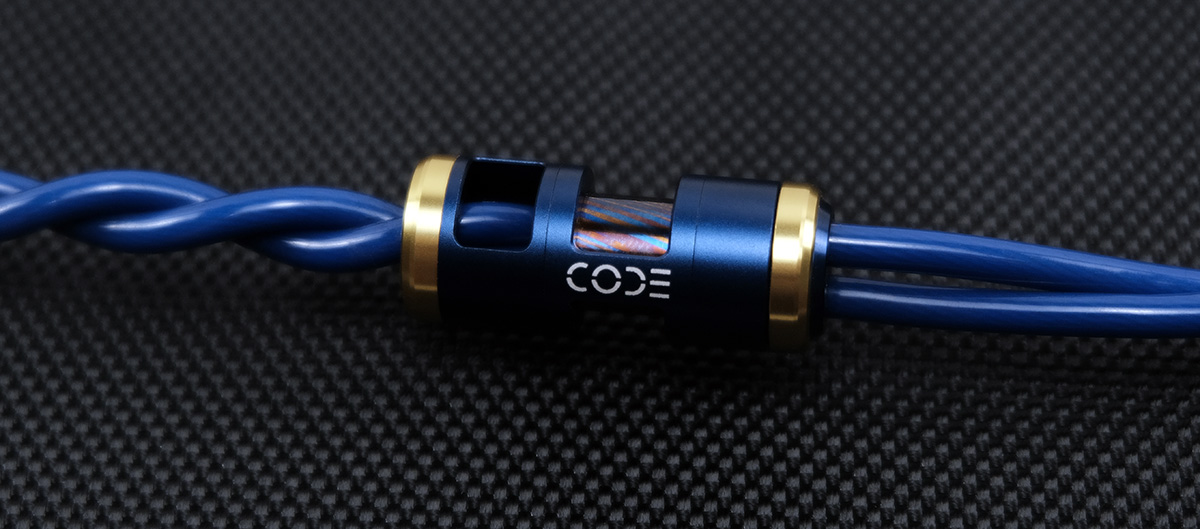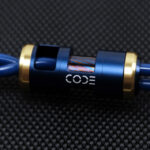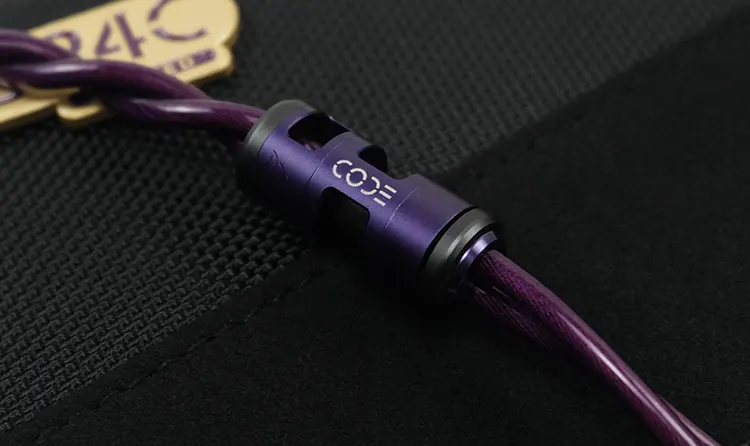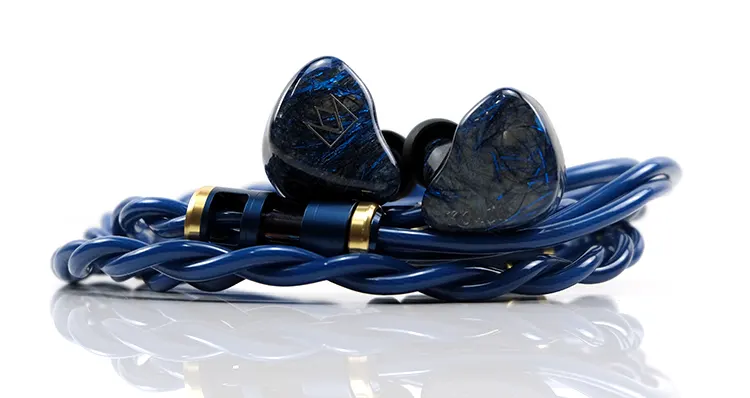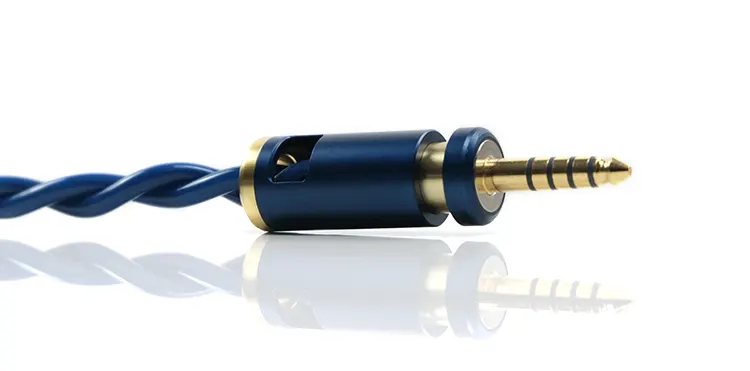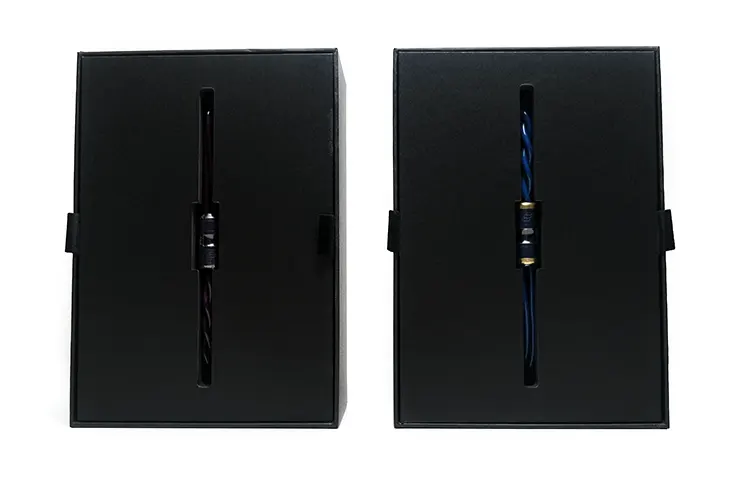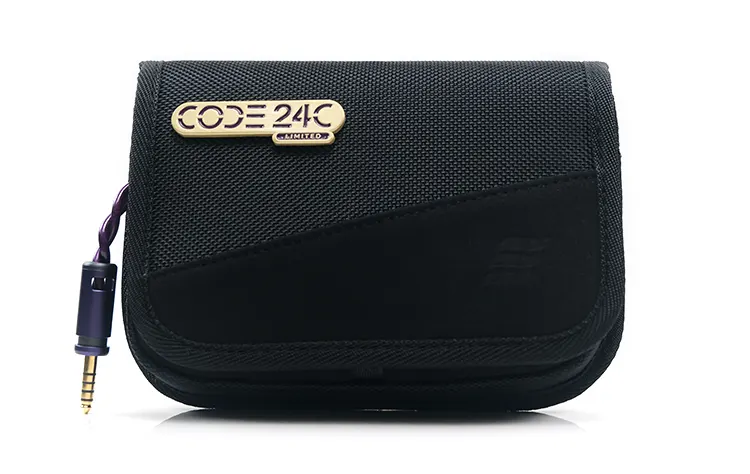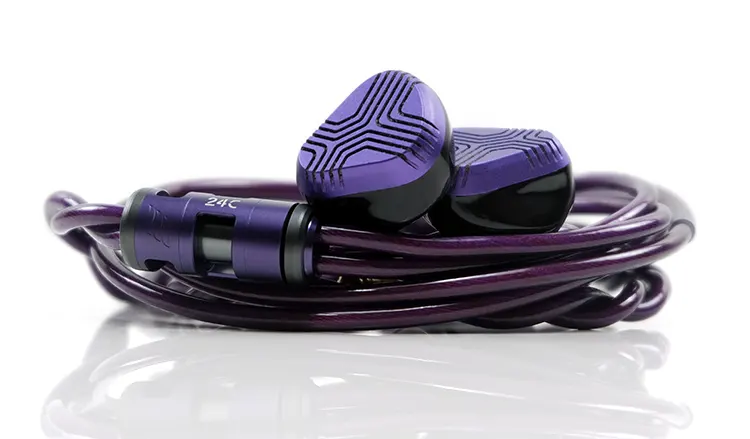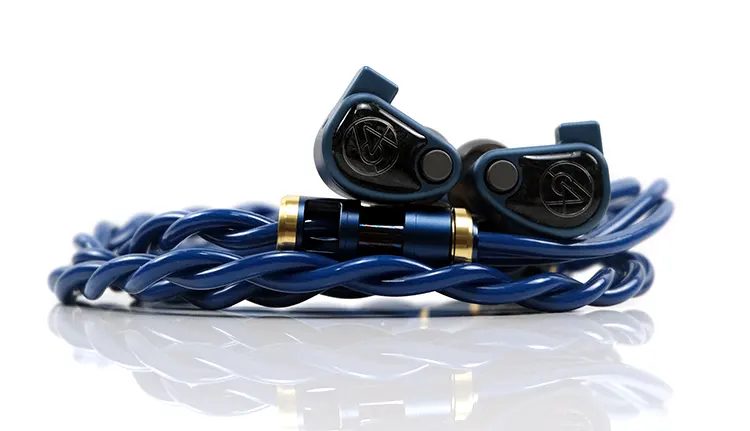Today, we review the Effect Audio Code 24, which is a new aftermarket 2-wire 16.5AWG silver-plated copper Litz cable for IEMs and headphones. It is priced at $799.
Disclaimer: This sample was sent to us in exchange for our honest opinion. Headfonics is an independent website with no affiliate links or services. We thank Effect Audio for their support.
To read more about Effect Audio gear previously assessed on Headfonics click here.
Note that this article follows our current scoring guidelines which you can read in more detail here.
Effect Audio celebrated the new year with the launch of not one but two Code Series aftermarket audio cables for IEMs and headphones. Code 24 and Code 24C Limited now take their place alongside Code 23, a release that was reviewed by Josh early last year.
Of the two, Code 24 is the ‘premium’ release and the flagship of the Code Series cables at $799. The Code 24c Limited is more moderately priced at $499 just behind Code 23 in the packing order. The older high-end Code 51 has been discontinued for some time now.
What ties all these Code Series cables together is their use of a Solid Core System combined with some colorful finishing and a generally “thicc boi” appearance from unusually large gauge wires making them amenable to both IEM and headphone use.
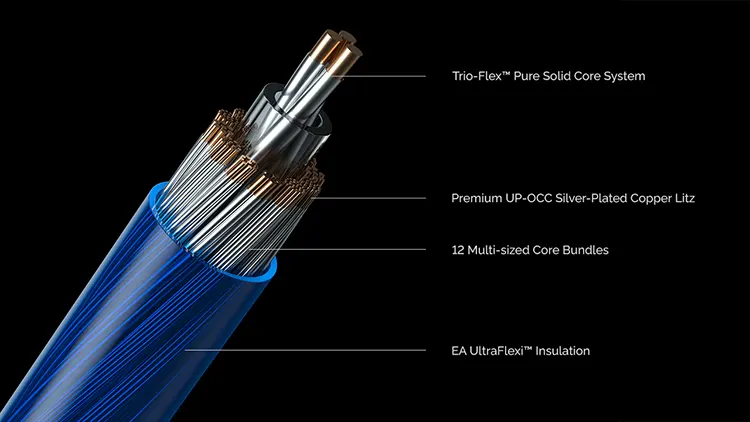
Materials & Geometry
The theme is relatively consistent throughout the Code Series to date with its use of copper and variations thereof.
Code 24 uses a hefty 16.5AWG gauge 2-wire which is a similar gauge size to Code 23 but replaces the UP-OCC copper Litz with UP-OCC silver-plated copper Litz wire. Code 24C Limited tones down the girth a bit more with a smaller 18.5AWG gauge 2-wire but retains Code 23’s UP-OCC copper Litz material.
All wires within each cable have a similar proprietary multi-size strand blend with Code 24 using 13 multi-sized core bundles and Code24c Limited’s smaller gauge wire allowing EA to use a larger 17 multi-sized core bundle structure.
The solid core structure at the heart of each cable remains, however, this has been refined from the previous Core 23 design which got a lot of user feedback on how stiff it was for IEM use.
Now we have a new Trio-Flex™ Pure Solid Core System which consists of 3 slightly smaller core wires as opposed to one big fat single version. That will give both cables more pliancy and better-handling characteristics over the stiffer single solid core Code 23.
The key difference between each cable’s Trio-Flex™ Pure Solid Core System is the material being used with Code 24’s using UP-OCC silver-plated copper Litz and Code 24C Limited using UP-OCC copper Litz.
Both the Code 24 and Code 24C Limited samples I have here and have been testing are the IEM versions but in essence, the headphone version of these cables will have the same shared geometry characteristics and EA UltraFlexi insulation.
Design
The design language of both of these cables is quite consistent with the initial Code 23 release last year.
Both are colorful creations, wide in girth with some extravagantly engineered barrels topped with low-profile elegantly designed chin cinches.
These are probably the most striking cable color schemes I have seen to date from Effect Audio. Instead of the usual transparent EA UltraFlex jacket, we have a solid-toned slightly reflective purple for the Code 24C Limited and a similarly designed blue for the flagship Code 24.
If you have matching IEMs for each scheme they look gorgeous paired. For example, Vision Ear’s EXT for the Limited’s purple and Noble Audio’s Ronin for the flagship blue complement each other perfectly.
Finishing
The finishing accents on the flagship Code 24 are bolder than the Limited version with striking gold trim on top and bottom of each barrel whereas the Limited version opts for a more subdued gunmetal gray.
These are new aluminum alloy barrels to me but Code 23 owners should be familiar with their unique cutaway design and it does seem a natural progression on the EVO 10 and 1’s raw wire display. However, there are some differences between the two new versions.
The Code 24 flagship splitter barrel uses a custom Timascus, (Titanium Damascus) design for the inner shield which, if anyone is familiar with Damascus, will know they have a very unique staining design on the surface.
The Limited uses a more minimalistic gunmetal-toned aluminum interior which is not as exotic perhaps but helps keep the design ethos consistent throughout.
The new barrels do feel substantially bigger than the Heritage series alternatives you find on the likes of the Patina Leather-quipped Leonidas II but given the size of the gauge of those cables I am not surprised they have larger barrels to manage them.
Each sample I have here comes terminated with a 4.4mm Pentaconn plugs which I believe is the default though you can opt instead for an interchangeable TermX system or an Android-compatible USB-C or iPhone Lightning alternative on EA’s website.
The connectors are by default ConX which includes 2-pin 0.78mm and MMCX but you can also add terminations such as IPX or Pentaconn for an additional $15.
Handling
These cables are much heavier than any cable I have worked with before from EA though from my brief experience using the Code 23 at CanJam Singapore 2023 they both are more flexible and not as stiff as the single-core variant.
However, there are some pros and cons when working with cables of this nature. I think it was smart for EA to use a braided finish instead of twister or rubber tubing.
For example, PLUSSOUND’s Plus Series of cables are also a bit on the thicker side with their coaxial geometry but nowhere near as thick at 24AWG. One of their finishing options is a twisted variation which makes the whole experience rather stiff and unwieldy.
The Code 24 and 24C Limited braiding helps keep both cables relatively malleable for rolling up. It’s only when you have them draped on your ears does the size and weight leap out as being something worth considering if this is an everyday cable for commuting for example.
I also noticed that the extent of the pressure on the top of your ear when wearing either cable is not as high as I expected. Both use a very soft and springy memory material finished with a natural curve at the base of each connector barrel.
The net result is a reduced level of contact on the back of your ear compared to the smaller softer EA cables which mitigates worries about how much weight will bear down on your ear.
Given they are larger cables, microphonics will be slightly higher above the splitter but the extent of the physical noise will largely depend on how well your IEM seals. The less it seals the less noticeable it becomes.
Accessories & Packaging
The packaging is almost a duplicate of each other save for some marketing materials and a badge on the Code 24C Limited carry case.
Neither box is too grandiose, it is fairly standard fare from Effect Audio with subtle color-coordinated branding on black cardboard boxes and a multi-layered presentation inside.
Each cable is front and center on the top layer with the carry cases just underneath. All the barrels have a thin plastic film wrap to protect them and I know some take them off right away whereas some leave them on for additional protection during use.
I do like the new cases and they seem to be more travel-friendly than the older leather-clad puck-style cases of the other series. The softer nature of the case structure might offer a little less protection to IEMs if you plan on using the case to house both the cable and the shells.
Both of the included carry cases are essentially the same with a split fabric outer, a magnetic flap, and a triple pocket inner organizer. The only difference on the outer is the inclusion of a badge for the Code24C Limited version.
The inner pockets are arranged two small to the front and one large to the rear. The two pockets to the fore I presume are for adaptors since it might be a bit dangerous to put your IEMs in them. The pocket to the rear has loads more space to fit both IEMs and cables.
Performance Impressions
The following performance impressions were made using a mix of Vision Ears EXT, Noble Audio’s Ronin, 64 Audio’s U4S, and the InEar ProMission X combined with the HiBy R8 II in low gain Turbo Mode as the main source.
Summary
Both of these cables are less reference and more how some would say veering to ‘the musical side’.
That means emphasizing the bass somewhat, bringing some vocal bloom to the table, and in the case of the flagship Code 24, teasing out some treble sparkle and enhanced spaciousness from monitors that are capable of delivering it.
If you are coming from the likes of the older EVO series then you are going to experience a seriously good upgrade in terms of dynamics, vocal clarity, and staging depth. It’s incredible to listen to just how far these cables have come from a few years ago in terms of performance.
Code 24C Limited
Code 24C Limited is as fulsome as the flagship but veers to the warmer side and slightly softer side with treble comparatively tamed down allowing vocals to come more to the fore with our tested monitors.
It’s an ideal candidate for vocal lovers who like a mid-forward and more intimate presentation backed up by a fairly beefy level of lows for their IEM listening preferences.
However, it can also be a good ‘lion tamer’ for shoutier vocal tuning such as the Empire Ears Odin. Here the vocals remain intimate but fatten up and sound a bit smoother or more euphonic with less treble bearing down on the midrange timbre.
Stripped-down audio tracks with soulful vocal mixes also sounded more soothing on cleaner IEMs of those with a generally feistier set of highs such as the Kublai Khan and the flagship Ragnar.
You can detect a slight drop in dynamic range compared to the larger 16.5AWG gauge of Code 24 and personally, I think its dynamic range and level of resolution are not as impressive when paired with articulated or hyper-detailed monitors such as the Ronin.
Code 24
The flagship Code 24 is more accurate sounding to my ear with our tested monitors. Its higher gauge rating also seems to increase the perceived dynamic range so you get a much tighter-sounding set of lows and more space through the mids and highs.
If you have a dynamic driver hybrid monitor such as the 64 Audio U4S or the Vision Ears EXT the additional punch and sub-bass power will be immediately noticeable. Not that the Limited edition shies away from bass quantity but rather it sounds softer and’ pillowy’ with the same IEMs.
I would argue at this price point, Code 24 is the ideal candidate for those who enjoy expansive synthwave, EDM, and R’n’B. It stretches imaging and staging space taller and deeper on the same monitors as the Limited though vocals are a little more on the neutral side in terms of positioning and coloration.
The realism in terms of textured detail, nuanced reflections in the vocal texture, and the pace of imaging flickering in and out is a big difference maker with the flagship cable over its smaller sibling. The additional treble presence does make a difference to the amount of perceived detail coming from each note.
So, whilst it’s brilliant for releasing dynamic driver power, it’s also very good at teasing out accuracy and resolution from more detail-orientated BA monitors such as the ProMission X and the Ronin.
It doesn’t layer and shape the soundstage quite as brilliantly as the older Leonidas II. Vocals do not leap out quite as well as the Heritage Series Class but the power and snap from this lively cable is very addictive.
Click on page 2 below for our recommended pairings and selected comparisons.

